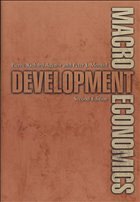Development Macroeconomics was hailed on its publication in 1996 for providing a clear, rigorous, and long-needed synthesis of recent work in the field. This revised edition brings that achievement up to date. Addressing an audience of policy-oriented economists and theorists, graduate students, and advanced undergraduates, Pierre-Richard Agénor and Peter Montiel review and assess the burgeoning research done in the past two decades, paying special attention in this new edition to issues that have recently gained in importance among developing countries, such as the interaction between macroeconomic policies and long-term growth, the political economy of macroeconomic reform, the management of capital inflows, and currency crises.
As Agénor and Montiel show, development macroeconomics has become a vital subdiscipline of macroeconomics. In the past, general macroeconomic perspectives on developing countries were divided into the ideologically charged categories of "monetarist" or "structuralist," but a vast literature has since developed that treats the problems of developing countries with the analytical tools of modern macroeconomics. The authors' coherent and rigorous treatment presents this new analysis and empirical work in an unusually lucid and unified way. It includes extensive empirical material describing the characteristics of the developing-country macroeconomic context. It explores how the analytical tools of modern macroeconomics can be adapted to accommodate such characteristics, and it uses the resulting models to analyze a diverse set of macroeconomic issues that developing countries have confronted in recent years. This is a crucial book for anyone wishing to understand this rapidly changing field.
As Agénor and Montiel show, development macroeconomics has become a vital subdiscipline of macroeconomics. In the past, general macroeconomic perspectives on developing countries were divided into the ideologically charged categories of "monetarist" or "structuralist," but a vast literature has since developed that treats the problems of developing countries with the analytical tools of modern macroeconomics. The authors' coherent and rigorous treatment presents this new analysis and empirical work in an unusually lucid and unified way. It includes extensive empirical material describing the characteristics of the developing-country macroeconomic context. It explores how the analytical tools of modern macroeconomics can be adapted to accommodate such characteristics, and it uses the resulting models to analyze a diverse set of macroeconomic issues that developing countries have confronted in recent years. This is a crucial book for anyone wishing to understand this rapidly changing field.

